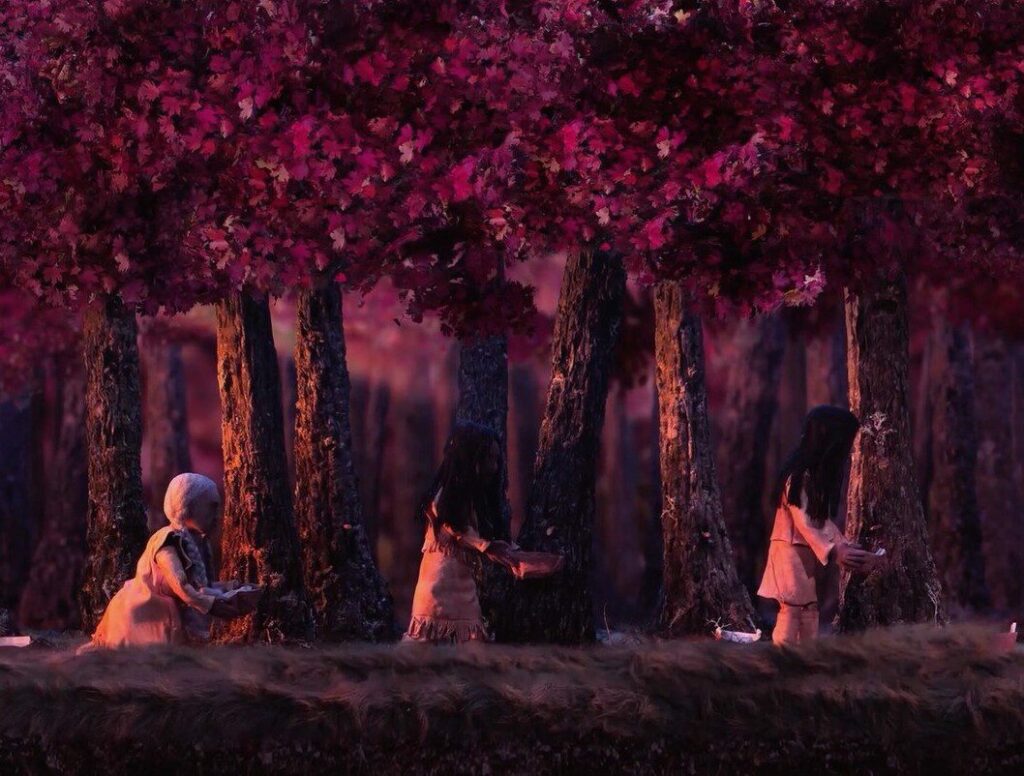Camera Austria, Graz, Austria
13 Mar 2021 - 23 May 2021

Amanda Strong, still from: Biidaaban (The Dawn Comes), based on three stories from Leanne Betasamosake Simpson, 2018.
Camera Austria presents If Time Is Still Alive: The City & The Good Life with works by Black Quantum Futurism Collective: Camae Ayewa & Rasheedah Phillips, Eva Egermann, School of Temporalities: Maja Bekan, Annette Krauss, Julia Wieger, Amanda Strong & Leanne Betasamosake Simpson and Ultra-red. The exhibition is on view until 23 May and curated by Urban Subjects (Sabine Bitter, Jeff Derksen, Helmut Weber).
The good life, and the life of the city, is now a question of both time and space. While we can see the effects of the spatial order of the pandemic on cities and publicness—with the distancing of bodies, the closing of shops and restaurants, et cetera—how does the temporal order become visible and understood? Out of this current unstable social context, the exhibition asks, in general, what new forms of time, what temporal practices and ways of being, already exist within or under what Elizabeth Freeman has called “chrononormativity.” And what new forms of non-hegemonic time might emerge? Will the long-promised reconfiguration of time and life and work materialize in a way that will make more life possible, perhaps even a good life, a better life? Will artistic practices and the practices of those at the margins of time be able to create chronotopes—connections between space and time—that make these new time-space relations visible in their importance for public life, politics, and society?
Thus in the film Biidaaban (The Dawn Comes) (2018) by Amanda Strong and Leanne Betasamosake Simpson, the settler-colonial temporality and the model of a good life based on property, which literally blocks access to the land in the film, are overturned to show a configuration of time that is more relational, with the separation of past and present collapsed.
The works of the Black Quantum Futurism Collective (BQFC), a collaboration between Camae Ayewa and Rasheedah Phillips, opens up a Black radical time through chronopolitical acts of listening, of community organizing, and through, as Phillips writes, “new communal temporal dynamics.”
Ultra-red’s practice of political listening reflects social engagement and is an act of sincerity for the communities they work with. The question “What is the sound of the good life?” can be answered through the act of listening to the present and the temporalities of the everyday within the Covid-19 moment.
Similarly, the School of Temporalities (Maja Bekan, Annette Krauss, Julia Wieger), as a fluid collaboration, is investigating the gendered experience of time within the Covid-19 moment by conducting interviews with women from different communities, with different jobs and varied experiences of temporality.
Eva Egermann’s work points to the experience of non-normative bodies within a regime of “ability” that is temporal. It is unfortunately easy to see how the world is designed for normative bodies and how many physical barriers this sets up.
This exhibition recognizes the role that art plays in producing and directing public space. Following on this crucial challenge, If Time Is Still Alive shifts emphasis to how art can enact other times and also create a public time that may in turn reshape the present and the future. This exhibition also recognizes the power of the representation of ways of being together—perhaps a next step in thinking about the good life—that artistic practices can create alongside or in concert with other collective practices. If there is a new temporal regime emerging, then how can it become lived socially and be visible artistically?